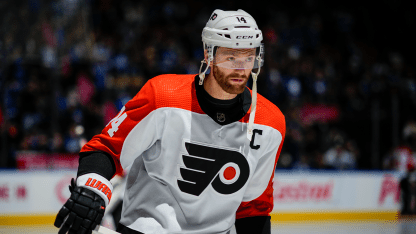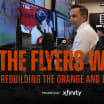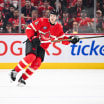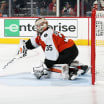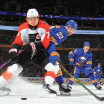By the time Claude Giroux played his 1,000th and final regular season game as a Flyer on March 17, 2022, he'd been the Flyers captain for a decade. Giroux had already surpassed Hockey Hall of Famer Bobby Clarke as the longest-tenured captain in franchise history.
Clarke had two stints as captain. He took over the "C" from Ed Van Impe during the 1972-73 season and held the captaincy through the end of the 1978-79 season. Still an active player, Clarke accepted an offer from head coach Pat Quinn to become an assistant coach while also continuing to play. However, doing so meant giving up the captaincy to Mel Bridgman.
Quite simply, it's a conflict of interests to be both the captain (or an alternate) and an assistant coach. One of the most important behind-the-scenes roles of the captain is to be a conduit between the players and the coaching staff. As he deems necessary, a captain will also sometimes advocate for teammates with the coaches. It's impossible to do that if the captain is also one of the coaches on staff.
Bridgman captained the Flyers until he was traded to the Calgary Flames in November 1981 for defenseman Brad Marsh (himself the Flames captain at the time). For the remainder of the 1981-82 season and a portion of the 1982-83 campaign Hockey Hall of Fame left winger Bill Barber took over the captaincy. No longer a playing assistant coach after Bob McCammon replaced Quinn as head coach, Clarke resumed the captaincy in December 1982 until his retirement as a player at the end of the 1983-84 campaign.
Because Clarke's captaincy was separated into two separate tenures -- and interrupted for nearly three-and-a-half seasons -- Giroux ultimately surpassed the franchise's most iconic player for the lengthiest captaincy run in Flyers history. Meanwhile, the likes of Dave Poulin (five-and-a-half seasons, two trips to the Stanley Cup Final, dealing with the tragic death of Pelle Lindbergh), Eric Lindros (five-and-three-quarters seasons, one trip to the Cup Final), and Mike Richards (three seasons, one trip to the Cup Final) all had notable captaincy tenures in between Clarke and Giroux.
Following Giroux's trade to the Florida Panthers on March 19, 2022, no Flyers player wore the C. When John Tortorella became the head coach during the summer of 2022, he refused to appoint a new captain until such a time that what he felt was a dysfunctional locker room had been repaired. At the start of the 2023-24 season, only Scott Laughton (wearing an alternate's "A") was assigned a letter.
Finally, on Feb. 14, 2024, the Flyers named veteran center Sean Couturier as the new captain. Travis Konecny joined Laughton as an alternate.
While Couturier -- a beacon of professionalism and integrity -- has immediately been hailed as an ideal choice for the new captain, the post All-Star break timing raised a question: Why now? Why not at the start of the season.
The short answer: the Flyers had to make certain first that Couturier would be healthy enough to accept the mantle. Keep in mind that he missed two-thirds of the 2021-22 season and the entire 2022-23 campaign due to two surgeries on his back. From a practical standpoint, it's very hard -- nearly impossible, in fact -- to lead when you're unable to play at all or playing at a severely diminished capacity.
In his usual colorful way, Tortorella explained why on Thursday.
"Last season, Coots was a total pain in the ass to me. He was always complaining about this or that to me. He wanted to play so badly, and he couldn't. To be honest, I wasn't sure how our relationship would go," Tororella said.
"Don't get me wrong but before I came here, I respected him a lot from afar about how he played the game the right way. Now I respect him even more for how he prepares himself to play, how he just goes about his business every day, and for what a smart player he is. He represents what you look for in a captain."
Tortorella added that Konecy's appointment as an alternate recognizes his maturation as a player. Laughton remains a unifying presence who understands what it means to be a Flyer, on and off the ice. It's not a coincidence that the new captain and both alternates have spent their entire professional careers in the orange and black.
Naming Couturier as captain and having Konecny join Laughton as an alternate is more of a symbolic change than a substantive one. On a day-to-day basis, it will be business as usual. Even so, there is meaning behind the decision.
In hockey, leadership doesn't come from only one one player. It takes a leadership group that also includes the alternates and at least a couple players with no letter on their uniform but important roles on the ice and in the dressing room.
The number one key to success is for the player to remain true to his natural personality and style. Couturier is not a bombastic type of leader (ala Chris Pronger) nor a natural policeman who keeps everyone else in line but is also the first in to vehemently defend a teammate (such as the style exhibited by longtime Flyers alternate Wayne Simmonds).
Couturier is more of a leader by example. He isn't a rah-rah type but speaks with honesty and integrity when there's something that needs to be said. He always comes ready to play, makes no excuses and is self-motivated. Those traits are central to the identity the Flyers are on their way to re-establishing for the long haul.
Tortorella said that the trio of Couturier, Laughton and Konecny are not the only leaders in the Flyers' dressing room, "but we're comfortable with that group wearing the letters."
The head coach did not mention whom he considers to be the other leaders in the room. However, the ranks likely include veteran winger Garnet Hathaway. veteran defenseman Nick Seeler, rugged veteran winger Nicolas Deslauriers, and a couple of emerging younger leaders such as Joel Farabee and perhaps Owen Tippett. Defenseman Travis Sanheim has also made big strides toward being part of the extended leadership group.

